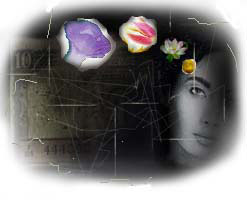Miscellanea/Kamala Das
The sanctimonious homilies and slogans make me want to puke
 When I visited my ancestral house recently I dug out a shrivelled
sweet potato from near the hedge. Below the red skin its pulp
was white and sweet. It seemed like a gift from my grandmother
who had died forty years ago. She had planted sweet potato and
yam near the hedges. In the summer vacations I spent with her
I had helped her to pluck lady's fingers, bitter gourd, string
beans and green chillies in the mornings before we went to bathe
in the pond. Nobody thought of going marketing.
When I visited my ancestral house recently I dug out a shrivelled
sweet potato from near the hedge. Below the red skin its pulp
was white and sweet. It seemed like a gift from my grandmother
who had died forty years ago. She had planted sweet potato and
yam near the hedges. In the summer vacations I spent with her
I had helped her to pluck lady's fingers, bitter gourd, string
beans and green chillies in the mornings before we went to bathe
in the pond. Nobody thought of going marketing.
Rice was grown
and later dried and stored in large wooden garners. The cows gave
us milk. There were mangoes, jack fruit, bananas and coconuts.
Once a year just before Onam, the harvest festival, the chetti
brought for us his bundle of clothes.
Today the house and the coconut grove are for sale. Two years
ago I received tempting offers from non-resident Indians but greedily
I bargained for more. Now with the political and economic instability
at the Centre, land prices have crashed. If people have purchasing
power they are afraid to reveal it for fear that their houses
might get raided. Important politicians and bureaucrats have been
discovered to be corrupt. The corrupt are yet to be punished.
The ordinary citizens fear the rise in inflation, nothing else.
The Indian rupee has been humbled incredibly. A fear of poverty
is in the air. Liberalisation did not bring us the prosperity
and progress promised by the former finance minister.
Some of us hailing from feudal backgrounds wonder how we can keep
feeding our servants. Our servants have thought themselves to
be members of the family. They will be shocked to hear that I
often think of easing them out. As a class they are averse to
moderation in eating. I shall have to go without health-medicines
and new clothes in order to retain them. We are emerging as India's
new poor, despite the fact that we have chauffeurs, housemaids
and cooks, all of whom dress smarter than we do.
This is a time when changes become imperative. Habits must change.
Beliefs must alter to suit the age. We have been taking out the
Gods, one by one, for dusting. We ought to consider if they are
fit to go up the mantel once again. If we discard them what would
happen to the empty spaces in our hearts? Alternatives may have
to be located.
Two days ago I went to Trivandrum and surrendered a bank-locker
once taken by my husband to store our jewels. At times of need
we sold bits of jewellery to survive. When I surrendered the locker
there was hardly anything worth carrying home. This must be the
fate of the Indian middle class that either chose honesty as
a desirable way of life or did not get an opportunity to be dishonest.
At shopping enclaves only the loud and the haughty make purchases.
People of our class do not any longer dare to look at silks or
jewellery. Going out to dine at hotels has ceased altogether.
Foreign cosmetics flood the local markets. But we tend our faces
by rubbing with a piece of bread dipped in milk. The yeast in
the bread imparts a glow.
Delhi is real. But it seems far away. The news we read do not
disturb our complacence. Pakistan has removed its titular head
in a military coup. Instead of rejoicing let us think of what
this collapse of democracy would mean to a neighbour like India,
eventually. Is anyone at Delhi formulating a new and vibrant foreign
policy? As potential victims of governmental muddles or mishaps
we have a right to know. The oft repeated and sanctimonious homilies
and slogans make us want to puke. The talk of our ancient culture
is equally sickening.
India is an old playhouse, a masquerade, a mela. If the Indians
stop playacting and show themselves to be normal human beings
we shall save what is to be saved in culture-integrity.
Illustration: Dominic Xavier
|





 When I visited my ancestral house recently I dug out a shrivelled
sweet potato from near the hedge. Below the red skin its pulp
was white and sweet. It seemed like a gift from my grandmother
who had died forty years ago. She had planted sweet potato and
yam near the hedges. In the summer vacations I spent with her
I had helped her to pluck lady's fingers, bitter gourd, string
beans and green chillies in the mornings before we went to bathe
in the pond. Nobody thought of going marketing.
When I visited my ancestral house recently I dug out a shrivelled
sweet potato from near the hedge. Below the red skin its pulp
was white and sweet. It seemed like a gift from my grandmother
who had died forty years ago. She had planted sweet potato and
yam near the hedges. In the summer vacations I spent with her
I had helped her to pluck lady's fingers, bitter gourd, string
beans and green chillies in the mornings before we went to bathe
in the pond. Nobody thought of going marketing.